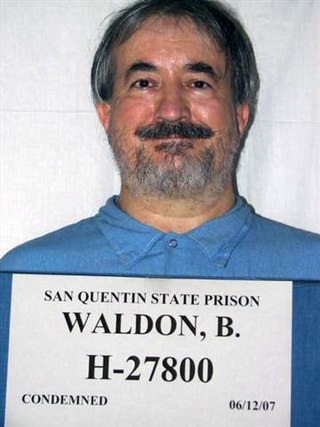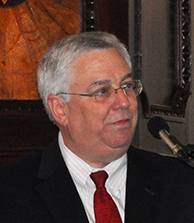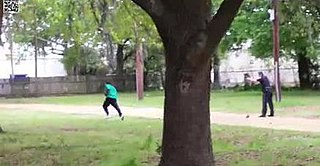A hung jury, also called a deadlocked jury, is a judicial jury that cannot agree upon a verdict after extended deliberation and is unable to reach the required unanimity or supermajority. A hung jury may result in the case being tried again.

Edgar Ray Killen was an American Ku Klux Klan organizer who planned and directed the murders of James Chaney, Andrew Goodman, and Michael Schwerner, three civil rights activists participating in the Freedom Summer of 1964. He was found guilty in state court of three counts of manslaughter on June 21, 2005, the forty-first anniversary of the crime, and sentenced to 60 years in prison. He appealed the verdict, but the sentence was upheld on April 12, 2007, by the Supreme Court of Mississippi. He died in prison on January 11, 2018, at age 93.

Brian Gene Nichols is a convicted murderer known for his escape and killing spree in the Fulton County Courthouse in Atlanta, Georgia, on March 11, 2005. Nichols was on trial for rape when he escaped custody and murdered Rowland Barnes, the judge presiding over his trial, a court reporter, a Fulton County Sheriff's deputy, and later an ICE special agent. Twenty-six hours after a large-scale manhunt was launched in the metropolitan Atlanta area, Nichols was taken into custody. The prosecution charged him with committing 54 crimes during the escape; he was found guilty on all counts on November 7, 2008, and was subsequently sentenced to life in prison.

Billy Ray Waldon, also known as Billy Joe Waldon or Nvwtohiyada Idehesdi Sequoyah, is an American former fugitive, American Indian Movement activist, and Esperantist who in 1986, became the 399th fugitive listed by the FBI on the Ten Most Wanted Fugitives List. Waldon was convicted of the murders of three people during a crime spree in 1985.

Channon Gail Christian, aged 21, and Hugh Christopher Newsom Jr., aged 23, were from Knoxville, Tennessee, United States. They were kidnapped on the evening of January 6, 2007, when Christian's vehicle was carjacked. The couple were taken to a rental house. Both of them were raped, tortured, and murdered. Four males and one female were arrested, charged, and convicted in the case. In 2007, a grand jury indicted Letalvis Darnell Cobbins, Lemaricus Devall Davidson, George Geovonni Thomas, and Vanessa Lynn Coleman on counts of kidnapping, robbery, rape, and murder. Also in 2007, Eric DeWayne Boyd was indicted by a federal grand jury of being an accessory to a carjacking, resulting in serious bodily injury to another person and misprision of a felony. In 2018, Boyd was indicted on state-level charges of kidnapping, robbery, rape, and murder.

Richard Mark Gergel is an American lawyer who serves as a United States district judge of the United States District Court for the District of South Carolina.

On the morning of September 4, 2005, six days after Hurricane Katrina struck New Orleans, members of the New Orleans Police Department (NOPD), ostensibly responding to a call from an officer under fire, shot and killed two civilians at the Danziger Bridge: 17-year-old James Brissette and 40-year-old Ronald Madison. Four other civilians were wounded. All of the victims were African-American. None were armed or had committed any crime. Madison, a mentally disabled man, was shot in the back. The shootings caused public anger and further eroded the community's trust in the NOPD and the federal response to Hurricane Katrina overall.

Jared Lee Loughner is an American mass murderer who pleaded guilty to 19 charges of murder and attempted murder in connection with the January 8, 2011, Tucson shooting, in which he shot and severely injured U.S. Representative Gabby Giffords, and killed six people, including Chief U.S. District Court Judge John Roll, Gabe Zimmerman, a member of Giffords's staff, and a 9-year-old girl, Christina-Taylor Green. Loughner shot and injured a total of 13 people, including one man who was injured while subduing him.
Judy Clare Clarke is an American criminal defense attorney who has represented several high-profile defendants such as Ted Kaczynski, Eric Rudolph, Dzhokhar Tsarnaev, Joseph Edward Duncan, Zacarias Moussaoui, Jared Lee Loughner, Robert Gregory Bowers, Burford Furrow, Lisa Montgomery and Susan Smith.
On April 2, 2012, a mass shooting occurred inside Oikos University, a Korean Christian college in Oakland, California, United States. Seven people were killed, and three others were injured. One L. Goh, a former student at the school, was taken into custody and identified as the suspect in the shooting. It is the deadliest mass killing in the city's history.

James Eagan Holmes is an American mass murderer responsible for the 2012 Aurora theater shooting in which he killed 12 people and injured 70 others at a Century 16 movie theater on July 20, 2012. He had no known criminal background before the shooting occurred. Before the shooting, Holmes booby-trapped his apartment with explosives, which were defused one day later by a bomb squad.

The Overland Park shootings were two shootings that occurred on April 13, 2014, at the Jewish Community Center of Greater Kansas City and Village Shalom, a Jewish retirement community, both located in Overland Park, Kansas United States. A total of three people were killed in the shootings, two of whom were shot at the community center and one shot at the retirement community. The gunman, 73-year-old Frazier Glenn Miller Jr. of Aurora, Missouri, originally from North Carolina, was arrested during the attack and was subsequently tried, convicted of murder and other crimes, and sentenced to death. Miller, a former Klansman, neo-Nazi and former political candidate, died in prison in 2021 while awaiting execution.

On April 4, 2015, Walter Scott, a 50-year-old black man, was fatally shot by Michael Slager, a local police officer in North Charleston, South Carolina, United States. Slager had stopped Scott for a non-functioning brake light. Slager was charged with murder after a video surfaced showing him shooting Scott from behind while Scott was fleeing, which contradicted Slager's report of the incident. The racial difference led many to believe that the shooting was racially motivated, generating a widespread controversy.
David Isaac Bruck is a Canadian-American criminal defense attorney, clinical professor of law at Washington and Lee University School of Law, and director of the Virginia Capital Case Clearinghouse. Bruck was raised in Montreal, Quebec, Canada. He attended Harvard College and University of South Carolina School of Law. He has co-represented high profile defendants, including Ramzi bin al-Shibh, Dzhokhar Tsarnaev, Dylann Roof, and Susan Smith.

An anti-black mass shooting and hate crime occurred on June 17, 2015, in Charleston, South Carolina. Nine people were killed, and one was injured, during a Bible study at the Emanuel African Methodist Episcopal Church, the oldest black church in the Southern United States. Among the fatalities was the senior pastor, state senator Clementa C. Pinckney. All ten victims were African Americans. At the time, it was the deadliest mass shooting at a place of worship in U.S. history.

Emanuel African Methodist Episcopal Church, colloquially Mother Emanuel, is a church in Charleston, South Carolina, founded in 1817. It is the oldest AME church in the Southern United States; founded the previous year in Philadelphia, Pennsylvania, AME was the first independent black denomination in the nation. Mother Emanuel has one of the oldest black congregations south of Baltimore.

Dylann Storm Roof is an American white supremacist, neo-Nazi mass murderer who perpetrated the Charleston church shooting. During a Bible study on June 17, 2015, at Emanuel African Methodist Episcopal Church in Charleston, South Carolina, Roof killed nine people, all African Americans, including senior pastor and state senator Clementa C. Pinckney, and injured a tenth person. After several people identified Roof as the main suspect, he became the center of a manhunt that ended the morning after the shooting with his arrest in Shelby, North Carolina. He later confessed that he committed the shooting in hopes of igniting a race war. Roof's actions in Charleston have been widely described as domestic terrorism.
On November 27, 2015, a mass shooting occurred in a Planned Parenthood clinic in Colorado Springs, Colorado, resulting in the deaths of three people and injuries to nine. A police officer and two civilians were killed; five police officers and four civilians were injured. After a standoff that lasted five hours, police SWAT teams crashed armored vehicles into the lobby and the attacker surrendered.
A mass shooting occurred on September 24, 2017, when a gunman opened fire at the Burnette Chapel Church of Christ in Antioch, Tennessee, part of the Greater Nashville area, killing one person and injuring six others.
On October 24, 2018, a man and woman were shot and killed by a gunman at a Kroger grocery store in Jeffersontown, Kentucky, a suburb of Louisville.













